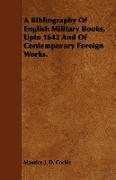- Start
- A Bibliography of English Military Books, Upto 1642 and of Contemporary Foreign Works
A Bibliography of English Military Books, Upto 1642 and of Contemporary Foreign Works
Angebote / Angebote:
INTRODUCTORY NOTE. WE know so well the value of a good Bibliography as those who have had to work at the same time on two topics, one of which has and the other has not been dealt with by a competent bibliographer. In the first case the student knows the obvious books, but he is fully aware that others exist, and it is his duty to find them. The preliminary labour of so doing is often enormous I have known would-be authors who found it so engrossing that they have finally produced nothing more than a list of sources, where they had intended to write a book. Those who are not so hint-hear, and who have got well to work on a hitherto neglegted subject, are always finding new authorities containing facts which make it necessary to delete whole pages of their manuscript. It has always seemed to me that, by some special perversity of fate, a traa of importance, which has hitherto escaped notice, invariabIy turns up just as the author has despatched the second revise of his proofs to the press. It is impossible, therefore, to exaggerate the debt which the specialist owes to chose who are good enough to make his way clear for him, by searching out all the scattered materials bearing on his subject. As one who, after working through the military aunals of the MiddIe Ages, is about to analyse the far more complicated Art of War of the Renaissance, I am myself bound to express my personal obligation to Mr. Cockle for his diligence and care in compiling this bibliography of English works bearing on War. A glance through his proofs was sufficient to show me dozens of interesting books which had not before came under my notice. In the fourteenth and fifteenth centuries the English had a school af war of their own, entirely dependent on the use of their great national weapon, the long-bow. UnfortunateIy the tactics of this invincible English archery were not committed to paper by any scientific soldier they have to be gathered from the chroniclers, who were generally clerics, and often unable to describe with clearness or accuracy the fights of which they have to tell. Just as laymen and professional soldiers bcgan to write, the predominance of the long-bow was ceasing. Roger Ascharns Cc Toxophilus I 545 has already to take the defensive against the incoming of firearms, and Sir John Smythe I590 when he enlarges an the great sufficiency, excellency, and wonderfull effects of archers in his Discourses, is the champion of a cause that had already been Iost. Though many of the militia who had been called out against the Armada in I 588 were still armed with the bow, yet before 1600 Sheriffs and Lords- Lieutenant had begun to refuse to put into the ranks any man bearing the old national weapon. Roger Williarns and Barwick had demolished all Sir John Smythes old-fashioned theories. It is a thousand pities that WC have not any literary survivals from the earlier contentions between the advocates of the bow and the arquebus, which must have begun a full century before Smythe and Williams engaged in their controversy. The smaller firearms had been seen in England ere the Wars of the Roses came to an end they had figured at the second battle of St. Albans and at Stoke Field. Yet they failed to make much way on this side of the Channel till the reign of Henry VIIP. was far advanced...
Folgt in ca. 10 Arbeitstagen
